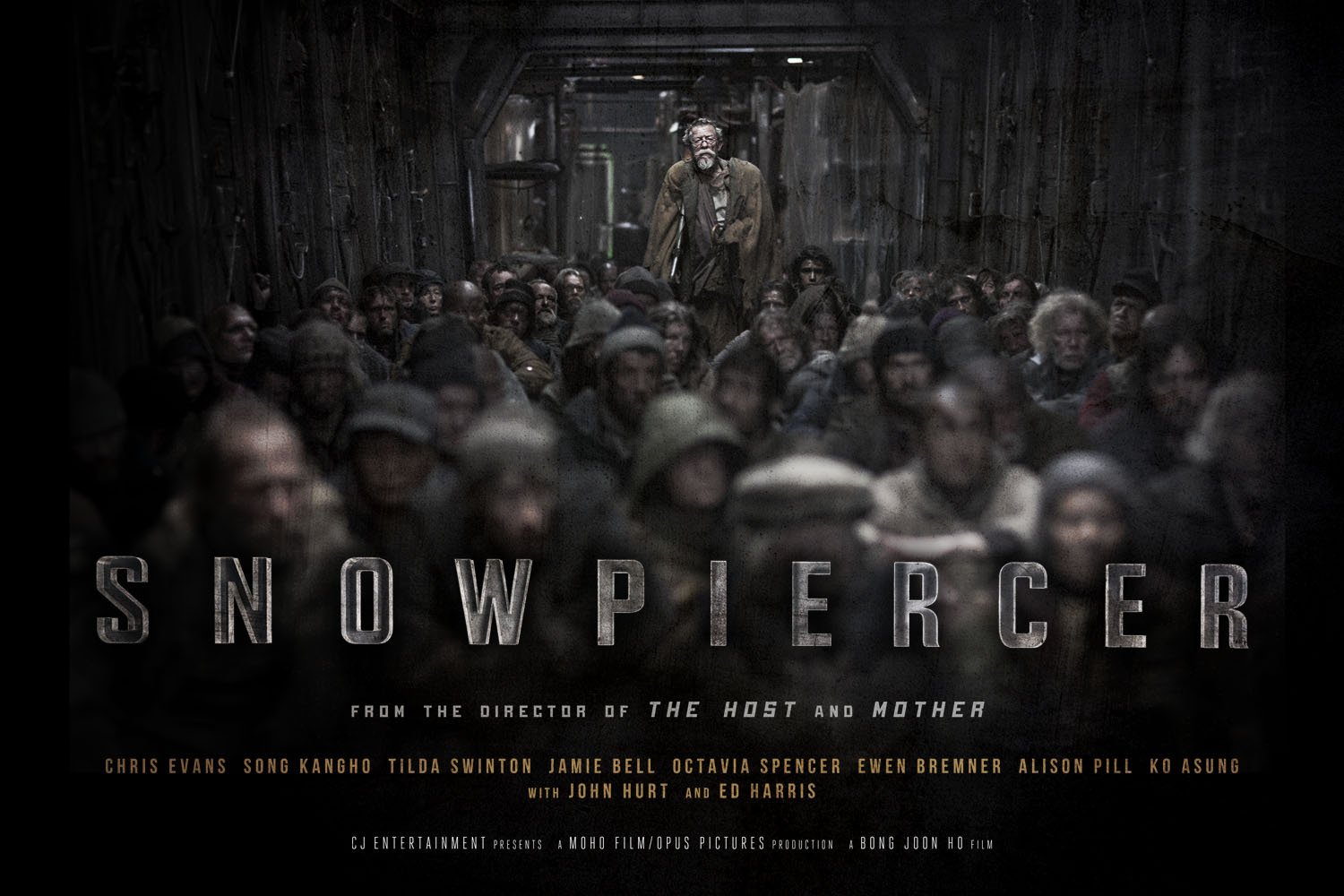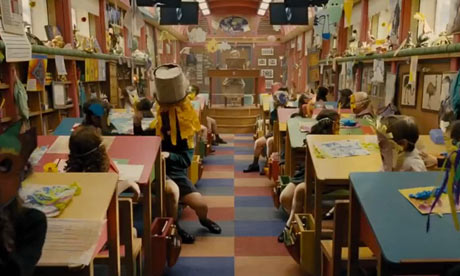
Geekzine’s sole foray to the Edinburgh International Film Festival 2014 was to check out Bong Joon-ho’s multifaceted dystopian sci-fi epic Snowpiercer. Still to find a distributor in the UK, the film has garnered rave reviews everywhere it’s been shown, due to its intriguing premise, talented ensemble cast and stunning set design. We sent Jim along to see if this Korean/American co-production lived up to the hype…..
Oppressive societies, environmental catastrophes, revolutionary uprisings, post-apocalyptic survival; these are some of the most tired and overused themes in the history of science fiction cinema, but that doesn’t mean they can’t be used in the creation of an original and thought-provoking story. As a film, Snowpiercer excels on many levels, but arguably director Bong Joon-ho’s greatest triumph is using such well-worn tropes as the foundation for a story which is as emotional as it is cerebral, and feels like the most original science fiction film since Shane Carruth’s Primer.
In the near future, attempts to stop global warming using a chemical called CW-7 result in the onset of a new ice age. Most of humanity dies out, but a few remnants survive aboard a gigantic train – the titular Snowpiercer – a technological marvel which remains in constant motion, supporting a self-contained ecosystem and circumventing the frozen globe once every year. A rigid new societal structure has emerged in this rail-bound world, with the wealthy, decadent first class passengers enjoying a life of leisure in the front carriages, while an oppressed and half-starved underclass live in grimy squalor in the tail section. The regular acts of brutality meted out by bureaucrat Mason (Tilda Swinton) and her henchmen upon the tail-enders are the sparks which light a revolutionary fire at the back of the train, and Curtis (Chris Evans) and Gilliam (John Hurt) see an opportunity to launch the uprising they’ve been planning for years. A gruelling, bloody battle ensues as the revolutionaries fight their way inch-by-inch to the front, aiming to take control of the hallowed engine, an object which has taken on an almost religious significance for the train’s passengers. A drug-addicted security expert (Song Kang-ho) enables the tail-enders to pass through the many doors standing between them and the front, and also offers an alternative vision to Curtis’ revolutionary narrative, one which threatens to change the passengers’ entire way of life.

Part war film, part social commentary, part spiritual journey; Snowpiercer juggles these competing themes and manages to tell a compelling story at the same time. The world Bong creates, both through inventive scripting and incredible set design, is a twist on the familiar post-apocalyptic survival concept, its originality coming in the form of its train-based setting. Having all the action take place within the confines of a series of rail carriages creates a claustrophobic atmosphere, and in several scenes when bloody violence erupts there is nowhere to hide from the carnage, either for the characters or the audience. There’s a healthy dose of weirdness, too; as Curtis and his allies advance up the train, they encounter a series of bizarre miniature worlds, each contained within its own carriage. There’s a peaceful garden, a breathtaking aquarium, a crowded hairdressers and even a sushi bar. A shocking encounter in a brightly coloured (yet sinister) school room shows how insidious the rhetoric of the first class passengers has become, and a sequence where the revolutionaries find themselves in pitched battle with a group of masked swordsmen is terrifyingly intense. These latter two scenes highlight the key strength of the film, namely the ability to marry slick action sequences and big-budget visuals with some surreal subject matter and truly arresting imagery. Bong wears his influences on his sleeve (echoes of Terry Gilliam’s work abound throughout), but isn’t limited by them. This is a film that couldn’t have happened without Hollywood, but nonetheless feels in no way part of it; a blockbuster with a truly international mentality, comfortable with both oddness and ambiguity.
The film’s social commentary is, however, rather obvious, and at times the allegories become far too heavy-handed – one particular subplot concerning stolen children feels like satire delivered with a sledgehammer – but in reaching for an original take on this grand theme Snowpiercer gets far more right than it does wrong, and proves once again that science fiction is a highly effective context in which to discuss the real world. The character types on show aren’t terribly original, either; we’re all familiar with The Idealistic Revolutionary Who Questions His Beliefs (Evans) and The Evil Henchman Who Just Won’t Die (the rather ordinary-looking but nonetheless frightening Vlad Ivanov), but some late revelations about a dark and bloody past bring a healthy amount of moral ambiguity to the film’s character development. In addition, any cliched characterisation is more than made up for by the terrific performances delivered by the entire cast. Swinton, Hurt and Song are all utterly captivating, and there are great supporting turns from the likes of Jamie Bell, Octavia Spencer and Ewen Bremner. But it’s Chris Evans, in what is probably a career-best performance, who gives the film its heart, and Curtis’ gut-wrenching personal journey from one end of the train to the other is what elevates the movie above and beyond sensationalist (if beautiful) political fable.

Snowpiercer can be interpreted in many ways: it’s an allegory for global capitalism and its exploitation of the working class; it’s a cautionary fable about respecting nature and tackling pollution; it’s an anti-technology polemic warning of humanity’s hubris and our worship of sophisticated machines; it’s a study of human nature, exploring how every one of us can be both a hero and a villain. The film can be all of these, but the thing is, for the most part you’ll be too busy enjoying yourself to decide which of them fits best for you. For all its political and spiritual symbolism, Snowpiercer is also just a damn good story with sympathetic characters and stunning visuals, and that’s a ringing endorsement for any movie. The statements it makes and the questions it asks are just the icing on the cake, and further proof (as if any were needed) that it’s still possible to make sophisticated and thrilling science fiction films in an age of vacuous, CGI-drenched blockbusters.
